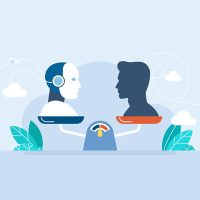How Is Human Error Different From Machine Error In Car Accidents?

Autonomous vehicle technology is not an apocalyptic battle between humans and machines. In most new cars driving home from the dealership today, the human and the car share decision-making responsibilities. Autonomous vehicle technology is a matter of how much, rather than a yes or no question. Journalists have been saying for several years that self-driving cars are coming soon to your local roads, and this sets off the usual exaggerated reactions from the Internet about how robots will soon replace us and the advent of self-driving cars spells the end of humanity. More relevant to your own safety today, and to your upcoming decisions about vehicle purchases, is how well each facet of autonomous technology tells us about which vehicle. The studies on what fully autonomous cars can and cannot do can also be informative about the capabilities and limitations of the autonomous driving technologies currently present in your car or the car that hit you. If you have been injured in an accident involving a car with state of the art autonomous driving technology, contact a Columbia car accident lawyer.
New Report Shows Where Autonomous Vehicle Technology Still Has a Lot to Learn
In June 2024 in California, a driver caused a fatal accident; while police were responding to the accident, a car in self-driving mode crashed into one of the patrol cars that had just arrived on the scene. It sounds like the setup for a discussion about which is more destructive, humans or machines. According to a study recently published in the United Kingdom, human error causes 88 percent of car accidents. The question remains how many of those accidents could be prevented if artificial intelligence took the wheel.
Researchers at the University of Central Florida have recently published a study about the effectiveness of self-driving cars in various conditions. The cars in the study were in fully self-driving mode, a feature not available in most of today’s cars. They found that, in daylight conditions, self-driving cars were better than human drivers at preventing collisions with obstacles straight ahead of the car. At dawn or dusk, the self-driving technology was five times as likely to prevent a collision. When turning, the self-driving cars were only half as good as human drivers at avoiding collisions.
Another study published this year determined that automatic braking systems, an autonomous vehicle technology present in many of today’s new cars, also determined that the brakes work better in some conditions than others. They are best in daylight but less effective in darkness, dawn or dusk, rain, and snow. Furthermore, the automatic brakes work best at lower speeds, less than 45 miles per hour. New regulations require the brakes to be effective at speeds up to 62 miles per hour.
Let Us Help You Today
The personal injury lawyers at the Stanley Law Group can help you if you get the money you need after an accident where autonomous vehicle technology was a contributing factor. Contact The Stanley Law Group in Columbia, South Carolina or call (803)799-4700 for a free initial consultation.
Source:
news.sky.com/story/self-driving-cars-found-to-be-safer-except-at-dawn-dusk-or-when-turning-according-to-study-13155011#:~:text=While%20turning%2C%20self%2Ddriving%20cars,responding%20to%20a%20deadly%20collision.
